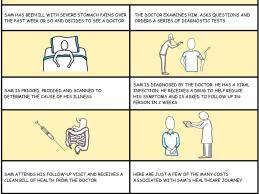Fard Johnmarr describes the vital role professional failures could play in fostering digital health innovation.
Let's face it. When it comes to tolerating and encouraging failure, there's a big disconnect between what people say and what they do.
In many organizations and businesses, failure and risk-taking is punished, even though both are vitally important -- especially in industries facing or undergoing significant digital-induced economic and human disruption.
Fard Johnmar,
Read More
Health IT & Digital Health-Opinion | Op-Eds | Guest Columns | Analysis, Insights - HIT Consultant
ICD-10 is the Pathway to Big Data in Healthcare
If big data in healthcare is the future for medicine, then ICD-10 is the way to get there.
Over the past year, most of the news surrounding the International Classification of Diseases, Tenth Revision (ICD-10) has been either bureaucratic or comical in nature. Last fall, another delay of the new coding system’s implementation deadline was met with a ton of mixed feelings. Most organizations truly weren’t ready. In fact, in a survey of 1300 healthcare professionals, 55% agreed with the
Read More
6 Metrics to Improve Hospital Revenue Cycle ROI
Lindy Benton, CEO of MEA|NEA, provides six key metrics to improve the ROI of a hospital revenue cycle management program to get cash in faster with less effort.
Revenue cycle management (RCM) is the process that manages claims processing, payment and revenue generation, and often entails the use of technology to keep track of the claims process at every check point. This allows the healthcare provider billing a patient the ability to follow along in the process and address any
Read More
Digital Health’s 4 Dirty Little Secrets Revealed
Digital health is hot. Consider the evidence.
StartUp Health recently reported that investors poured $5 billion into the digital health sector during the first three quarters of this year, double what was invested during 2013. (This is small change compared to what was invested in other industries, but it is a promising trend.)
Companies like Google Apple, Walgreens, CVS and Microsoft are seeking to shake up health with new digital innovations and initiatives.
And, hardly a day
Read More
Will the DoD Create Another Frankenstein EHR?
Will the DoD create another Frankenstein EHR monster? Don't trick us with dead data, treat us with middleware connectivity, Dr. Donald Voltz writes.
While many children will trick or treat, the DoD Healthcare Management System Modernization closes its bidding process today to replace their current EHR for active-duty personal and their families. The current system, the Armed Forces Health Longitudinal Technology Application (AHLTA) will be replaced with a commercial system and the
Read More
Like Scorpions, Closed EHR Systems Cause Paralysis
Take a step back from the challenges that surround health information technology (HIT) interoperability and you will recognize that market forces and a desperately fragmented health care system make hospitals and vendors act the way we do.
It calls to mind the fable of the scorpion and the frog, which is worth revisiting.
Wanting to cross a river, a scorpion spies a frog in the water and asks for a ride to the other side. Naturally afraid of being stung and killed, the frog hesitates, but is
Read More
5 Steps to Building Successful Digital Health Solutions
Dr. Saif Abed describes five key steps to building digital health solutions.
At times it might seem like the relationship between healthcare and technology is so broad that it’s beyond definition. Certainly, that’s a challenge for many of the different supporters of IT in healthcare as they have to contend with all the different tags and titles whether it’s digital health, mHealth or the more traditional health IT.
The thing is it doesn’t really matter. Whatever your flavor of technology in
Read More
TechCrunch Disrupt Europe Takes Digital Health Startups Seriously
Written by Ben Heubl, edited by Susan Williams
This year’s TechCrunch Disrupt Europe Conference in London presented the audience with more digital health innovation than ever before. Mike Butcher, Editor At Large at TechCrunch Europe expressed excitement at the increased tech startups emerging from Europe. The conference had a massive health angle, and as always, TechCrunch hackathons stimulated fantastic creativity towards building digital health solutions. Without further ado, behold these
Read More
Ebola Pushing EHRs in New Direction
Dr. Donald Voltz discusses how infectious diseases such as Ebola, enterovirus D68, and flu is pushing EHRs into the job of a central communications hub.
The recent spate of infectious diseases identified in the US-whether Ebola, enterovirus D68 or just the beginning of the plain old flu season, healthcare has become increasing complex. It involves more players in terms of patients, providers, administration, insurance , governmental bodies and now CDC screeners at airports. This leaves
Read More
The Critical Role of Health IT in the Ebola Outbreak
A recent article by Atul Gawande in The New Yorker describes the level of preparedness at Texas Health Presbyterian Hospital in Dallas, as it encountered the first case of Ebola to be diagnosed in the U.S. The emergency department was as prepared as anyplace, and had rehearsed the scenarios, and reviewed the CDC checklist for Ebola preparedness. They had asked about fever in people who had traveled from the region of West Africa beset by Ebola, per the protocol. In fact, the triage nurse in the
Read More








